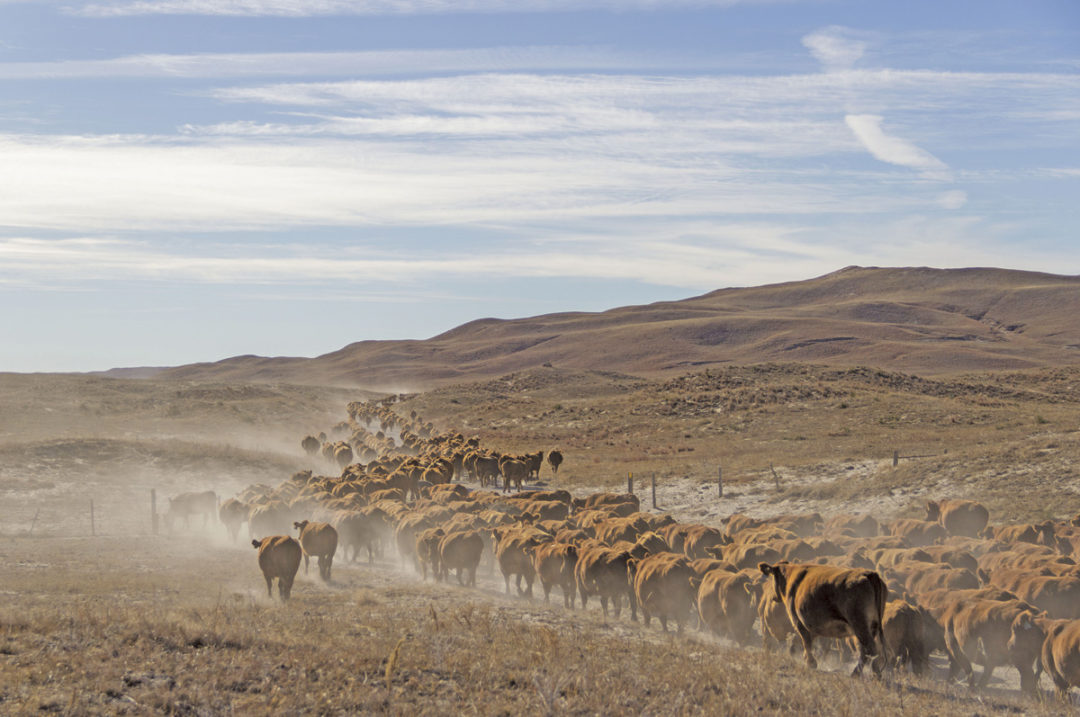Over the past two to three years, the heart of cattle country experienced extreme drought conditions. Many producers have faced difficult decisions concerning their cow herd health and maintenance on top of the financial pressure of managing through a difficult weather event. From reproductive rates to carcass merit, the impact of a drought can be felt for years to come.
“In 2012, we had a really bad drought here,” says rancher Joe Hatch, who frequently battles drought on his northern Colorado ranch. “The heifers born in the spring of 2012 have the worst reproduction of any set of cows that we have. Drought isn't a one-year thing. The effects of it can last 10 to 12 years. Those 2012 cows will have poor fertility for the rest of their lives.”
Craig Uden, a fourth-generation cattle producer and co-owner of Darr Feedlot in Cozad, Nebraska, echoed that sentiment of drought setting off a chain reaction. “When it hasn’t been profitable, people want to cut back on protein and minerals,” Uden says. “That’s the worst thing you can do. If the cow isn't in good shape, she won’t deliver passive immunity onto the calf, and that calf won’t be able to receive several vaccines."
The vicious cycle keeps playing out when it comes to carcass results. Uden has seen disruptions in grading from the 2021 drought in the western U.S. “A calf is born with so much genetic potential and so much intramuscular fat,” he says. “If that calf has to use its intramuscular fat to stay alive because it’s not getting enough nutrients from Mom, it’s going to pull some intramuscular fat out of its system to stay alive.” And that fat can’t be regenerated into marbling.
Uden said growth is dependent on cattle being managed on an inclining plane of nutrition, and if a drought disrupts that, cattle producers will not see calves that perform to their genetic potential, and carcass results will often disappoint.

Greener spring and summer pastures have been a welcome sight as cattle producers are starting to rebuild their post-drought cowherd by addressing lingering issues of nutrition, reproduction and herd health. Photo by Carla Leland.
Building back after drought
Although the Midwest is still experiencing drought this year, cattle producers in the West and southern Plains have gotten some relief this summer compared to the past two years, and recovering from the lasting impacts of a difficult season is top of mind for many.
The Red Angus Association of America will address these issues in its upcoming Commercial Cattlemen’s Symposium, a free program that will provide a space for cattle producers of all breeds to gather and learn from industry experts. The symposium will be held Sept. 13 in Denver, Colorado.
Specifically focusing on the theme of “Recovery After Drought,” the symposium will feature keynote speakers and panelists who will offer insight on drought management practices to efficiently manage a herd through a drought. While a lack of rain and heat stress is a stressful situation, the symposium will provide cattle producers with a wealth of knowledge to overcome adversity.
The event will include presentations from many industry experts, including:
- Rick Funston, professor of reproductive physiology at the University of Nebraska
- John Paterson, Multimin consultant
- Brian Fieser, ADM beef cattle nutritionist
- Tyler Melroe, BluePrint Nutrition general manager
- Jordan Shockley, University of Kentucky extension economist
- Chad Martin, vice president of cattle procurement for Tyson’s fresh meats division
- C.J. Blew of Blew Partnership in Hutchinson, Kansas
- Ronny Pope, ranch manager of River Bend Ranch in Limon, Colorado
- Steve Wooten, owner and operator of a multigenerational cow-calf enterprise in southeastern Colorado

Cattle producers will gather in Denver on Sept. 13 for the Commercial Cattlemen’s Symposium. Photo courtesy of Red Angus Association of America.
Topics covered at the symposium will include production efficiency, maintaining nutrition through drought, carbon credits and sharing the industry’s story of sustainability.
“We are excited to invite cattlemen and women of all breed interests to our Commercial Cattlemen’s Symposium in Denver,” says Katie Martin, production coordinator for the National Red Angus Convention. “The symposium is always a highlight of our annual convention. Attendees will leave with applicable knowledge to incorporate in their ranching enterprises.”
The event is open to all cattle producers and is offered at no cost. Participants will be able to network with other producers and visit a trade show with vendors presenting new information, research and the latest in cattle industry products. Lunch is included; however, registration is requested for accurate meal preparation. For more details and to register, visit the Red Angus Association of America website.
The Commercial Cattlemen’s Symposium is held each year in conjunction with the National Red Angus Convention, which will be held this year Sept. 13-15.






